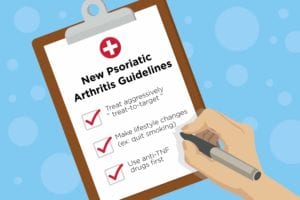

- Patients should be treated as aggressively as needed to reach a predetermined target (called a “treat-to-target” approach)—usually remission or low disease activity.
- Doctors should generally prescribe tumor necrosis factor inhibitors (anti-TNF medications) first. Those include drugs such as adalimumab (Humira), etanercept (Enbrel), golimumab (Simponi), and infliximab (Remicade).
- Oral small molecule (OSM) drugs may be used instead of anti-TNF drugs in people with mild-to-moderate PsA and mild-to-moderate psoriasis if those patients prefer taking a pill to getting an injection or infusion or if they can’t take anti-TNF drugs for a medical reason (like a history of serious infections). OSM drugs for PsA include methotrexate, cyclosporine, sulfasalazine (Azulfidine), leflunomide (Arava), and apremilast (Otezla).
The new psoriatic arthritis guidelines also include some recommendations for lifestyle changes to help manage PsA. The authors strongly recommend that current smokers quit, as cigarette smoke seems to interfere with the effectiveness of certain PsA medications (in addition to having other detrimental effects on the body). The full guidelines were published in the Journal of Psoriasis and Psoriatic Arthritis.





